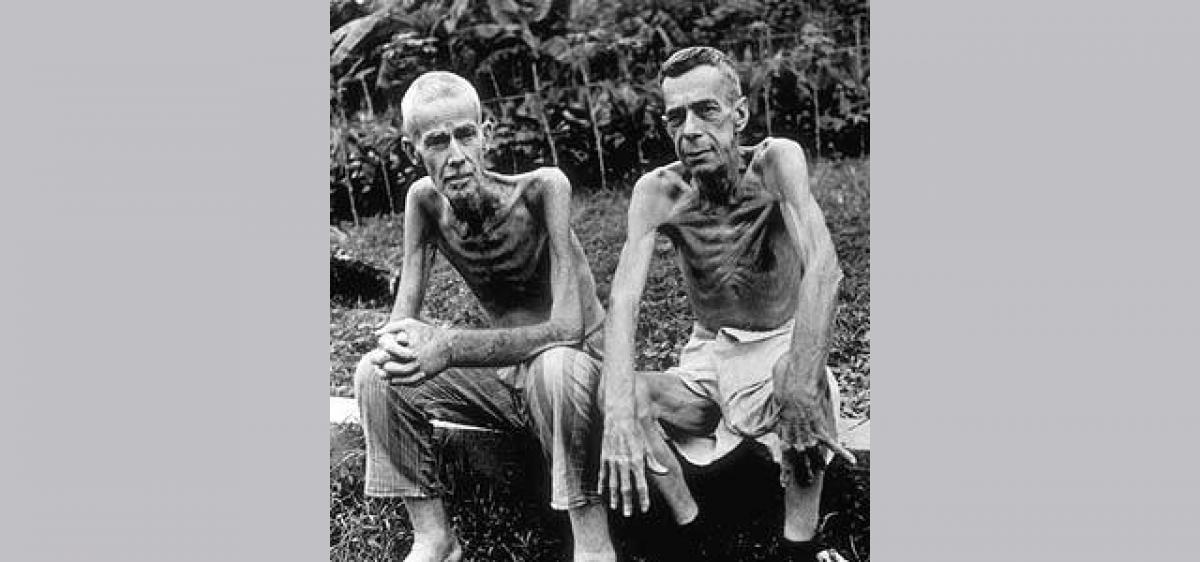A Beri beri bad problem!

Beriberi is a disease caused by thiamine (vitamin B1) deficiency. It affects a variety of organs and systems of the body, including the nervous system, digestive system, heart, and muscles. If untreated, it is fatal.
Beriberi is a disease caused by thiamine (vitamin B1) deficiency. It affects a variety of organs and systems of the body, including the nervous system, digestive system, heart, and muscles. If untreated, it is fatal.
The name ‘Beri-beri’ comes from Sinhalese, for ‘I cannot’— it signifies the weakness and helplessness of the afflicted.Thiamine (or thiamin) is one of the B vitamins, a group of chemically distinct, water-soluble vitamins that also includes riboflavin, niacin, pantothenic acid, pyridoxine, biotin, folic acid, and others. Thiamine is essential in small amounts for human health.
It is integral to the complex coordination of the Krebs cycle, which is the main biochemical pathway to extract energy from glucose, amino acids, and fat and it is needed for normal growth and development and to maintain proper functioning of the organs. Since it is water-soluble, thiamine cannot be stored in the body; however, once absorbed, the vitamin is concentrated in muscle tissue.
Among good sources of thiamine are various vegetables, including legumes and green peas, as well as liver, nuts, and yeast. The aleurone layer of unpolished rice is a rich source. Thiamine was first discovered in 1910 in Japan, as a result of research into how rice bran cured patients of beriberi.
Until that time, it was a mystery why beriberi was affecting so many people of all ages in Asia, and only in the early 1900s was it realized that rice bran contained something to prevent it. In many Asian countries, there was a reliance on white (polished) rice as a staple food, with white rice produced by removal of the bran, which contains most of the thiamine.
Kanehiro stood on the deck, looking at the raging waves. It looked like he had failed. “Doctor, Doctor”, a voice called. One of the ship’s crew came running to him. “Another soldier has taken ill”, he informed. “Please have a look at him , Doctor.”
Kanehiro sighed. It was of no use. How could he treat the patients without knowing what was causing their disease? He had looked at all their blood samples and had examined them in detail, but in vain. The cause of the disease still eluded him. “I shall come in a while”, he told the man, and headed for the captain’s cabin. He had to tell the captain that he had failed as a doctor. The Japanese Navy would suffer with incompetent doctors like himself on board. It would be better if they brought in someone else in my place, he thought.
The Captain was however in no mood to listen to Kanehiro’s tale of woe. “Ah, come in, Doctor”, he said jovially, a glass of rum in his hand. “I believe you’ve not met my good friends, merchants who trade in stones and spices and travel to mysterious lands”, he waved his hand at the gathering of well-dressed gentlemen, who seemed to be sharing a drink with the captain.
“Captain, I came to say that—”
“Is it about that fellow mumbling Beri-beri? Is he dead? Don’t bother, that fellow was never very good anyway. We just got a fancy name for that disease of theirs, though!” he chuckled, while his friends laughed. “I just hope we don’t catch it.”
“But Captain—”
“Oh, we can discuss everything after lunch. The steward just informed me that we have a feast waiting for us”, the Captain cut Kanehiro short and took him along with the others. Kanehiro had no option but to follow.
At the table, it really was a feast. Meat, fruits, vegetable stew and fried fish, and of course, the staple – white rice, were laid out in a delicious array. Kanehiro could hardly eat, while the captain and his friends ate with gusto. Kanehiro quickly finished his lunch, mumbled an apology for leaving the table so soon, and went out. He went down to the kitchen of the deckhands and the soldiers, his guilt weighing down on him. If the captain wouldn’t listen, he at least had to inform the poor soldiers whose mates were suffering and submitting to death.
When he reached their dining area, he was greeted by sounds of welcome. They were overwhelmed by his visit to their humble dining cabin. “Hey get a plate of good food for the Doctor”, called one. “Not just rice, you fool, look for something else—”
“Dr. Kanehiro, you are our savior here on board this cursed ship”, gushed another one of the cabin crew, while a seaman poured him a glass of ale.
Kanehiro looked curiously at what they were all eating. Every plate had a mound of cooked white rice, but nothing else. He took a few of the grains in his hands. “Isn’t this polished white rice?” he asked the steward. “Yes sir, it is”, the man informed.
“Don’t you get anything else to eat?” asked Kanehiro.
“Sir, this is the only thing that we get free aboard the ship. We poor soldiers can’t afford to pay for the fruits or the meat”, he replied.
As Kanehiro made his way back to his own cabin, he was lost in thought. Why were only the poor soldiers afflicted, and not the captain or the other rich merchants? It must be the food! Maybe the nutrition wasn’t enough. Maybe….
The Captain was surprised when Kanehiro knocked at his door that afternoon. “I have a solution”, he said firmly.
Meanwhile, in Java, it was quite the other way around. The settlers from Holland, who were a part of the Dutch East India company were a privileged lot, but were suffering from Beri-beri. Surprisingly, the poor people of the land hardly had anything to eat, but were safe from the disease.
And that was where a messenger came in search of Dr. Christiaan Eijkman, a doctor at a hospital. One of the assistants at the hospital led him outside instead of taking him to the doctor’s cabin. “Hey where are you taking me?” he asked. “I want to see the Doctor, not the sweeper!”
Dr. Christiaan Eijkman was carefully feeding the chickens in the hen coop, when the assistant arrived with the messenger. “Here, eat this…”, he was saying, as he threw some brown rice on the floor. The chickens rushed over to eat, flapping their wings.
Then he went to the next hen coop and threw some white rice on the floor. The chickens didn’t move. Some looked lethargic, and some looked like they were about to collapse. A few moved forward slowly and started pecking at the rice.
“Are you sure that’s the doctor?” asked the messenger dubiously. “What’s he doing with the chickens? Shouldn’t he be inside looking after the patients?”
The assistant shrugged. “Gone mad, I suppose”, he said. “As mad as the patients with Beri-beri in there.”
The doctor looked up and saw the messenger. “Ah, you must be the messenger from the medical panel”, he said, and eagerly reached out for the letter in the man’s hand. He tore it open and read it, and cursed under his breath.
“Why can’t he see it?” He stomped his foot on the ground angrily and pranced around in fury. He suddenly caught hold of the startled messenger’s arm, and dragged him to the hen coop.
“Look here, what do you see?” he asked, in a threatening voice.
“Uh… chickens?” suggested the frightened messenger.
“They’re the chickens I am experimenting on”, he said proudly. “Do you see those healthy chickens there? I have been feeding them brown rice. And you see those sick ones. They have been eating white rice. Now do you see the difference?
It’s in the rice! Rather, in the brown husk of the rice! And that’s what we’ve been missing! Why can’t the director understand? We should be eating the brown rice! And the disease can be wiped out. There’s no infection, no bacteria!”
He tore the letter to shreds and stamped on them. The messenger hurried away. “That doctor’s raving mad”, he whispered to the assistant whom he met on the way out. “He should be put in a cell and locked up!”
It wasn’t long before Eijkman was packed off back home. “How dare he suggest that we eat brown rice, the rice of the poor natives!” fumed the director of the medical panel.
But the director had to eat his words when Dr. Eijkman received nothing less than the Nobel Prize for his discovery of Vitamin B1- Thiamine- in the brown husk of rice!










